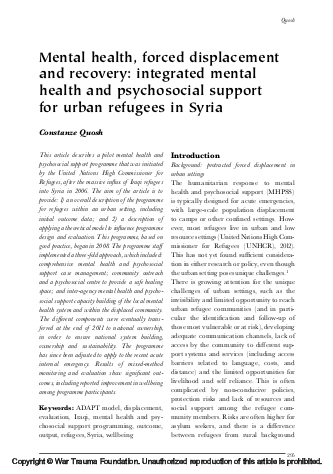
This article describes a pilot mental health and psychosocial support programme that was initiated by the United Nations High Commissioner for Refugees, after the massive influx of Iraqi refugees into Syria in 2006. The aim of the article is to provide: 1) an overall description of the programme for refugees within an urban setting, including initial outcome data; and 2) a description of applying a theoretical model to influence programme design and evaluation. This programme, based on good practice, began in 2008.The programme staff implemented a three-fold approach, which included: comprehensive mental health and psychosocial support case management; community outreach and a psychosocial centre to provide a safe healing space; and inter-agency mental health and psycho-social support capacity building of the local mental health system and within the displaced community. The different components were eventually transferred at the end of 2011 to national ownership, in order to ensure national system building, ownership and sustainability. The programme has since been adjusted to apply to the recent acute internal emergency. Results of mixed-method monitoring and evaluation show significant outcomes, including reported improvement in wellbeing among programme participants.
Links
Resource collections
- Accountability to affected populations (AAP)
- ALNAP focus topics
- UN Habitat - Urban Response Collection
- Urban Response - Urban Crisis Preparedness and Risk Reduction
- Urban Response Collection - Community Engagement and Social Cohesion
- Urban Response Collection - Economic Recovery
- Urban Response Collection - Environment and Climate Change
- Urban Response Collection - Housing, Land and Property
- Urban Response Collection - Urban Crisis Response, Recovery and Reconstruction
- Urban Response Collection - Urban Resilience